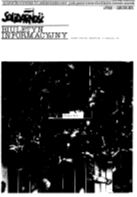
BIULETYN INFORMACYJNY "Solidarność za granicą" - 65
among others: * FRAGMENTY HOMILII I PRZEMÓWIEŃJANA PAWŁA II W POLSCE * "Solidarność" wita Ojca Świętego - fragmenty oświadczeń organizacji związkowych
More...We kindly inform you that, as long as the subject affiliation of our 300.000+ articles is in progress, you might get unsufficient or no results on your third level or second level search. In this case, please broaden your search criteria.

among others: * FRAGMENTY HOMILII I PRZEMÓWIEŃJANA PAWŁA II W POLSCE * "Solidarność" wita Ojca Świętego - fragmenty oświadczeń organizacji związkowych
More...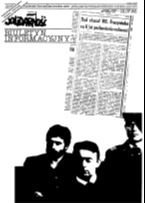

among others: * Przesłanie dla Solidarności * Powrót ze spotkania z Ojcem Świętym
More...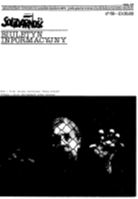
among others: * Zobaczyć na własne oczy - wywiad z Michelem Piccoli *Aktorzy nie dają się podejść
More...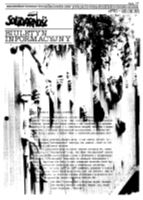
among others: * Gospodarczy dorobek stanu wojennego * Sprawozdanie TKR "Hutmen"
More...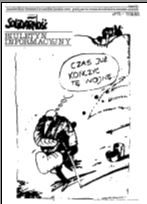
among others: * Lelewel /Liceum im-Joachima Lelewela w Warszawie * fundusz rozwoju rolnictwa - oferta Kościoła
More...
among others: * PROCES JANUSZA PAŁUBICKIEGO * "Głos" - program bieżący
More...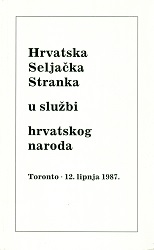
The booklet, published in 1987 by "Središnji odbor Hrvatske Seljačke Stranke" (Central Committee of the Croatian Peasant Party) with office in Brussels (Belgium), is a report on the "World Meeting of the Croatian Peasant Party and Croatian Workers' Union" (Toronto, May 1987) with contributions by: Juraj Krnjević, Lovro Črep, Josip M. Torbar, Eugen Laxa, Tihomil Rađa, Mehmed Bašić, Đuro Đurković, Mirko Vidović, Dorothy Obradović, Krešimir Butković, Zvonko Mustapić, Stjepan Golubić, Juraj Boljkovac, Stjepan Košutić, Ivo Tomić, Ferid Salihović,
More...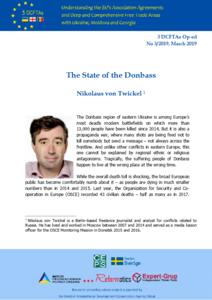
The Donbass region of eastern Ukraine is among Europe’s most deadly modern battlefields on which more than 13,000 people have been killed since 2014. But it is also a propaganda war, where many shots are being fired not to kill somebody but send a message – not always across the frontline. And unlike other conflicts in eastern Europe, this one cannot be explained by regional ethnic or religious antagonisms. Tragically, the suffering people of Donbass happen to live at the wrong place at the wrong time.
More...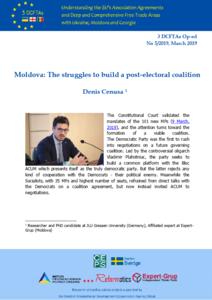
The Constitutional Court validated the mandates of the 101 new MPs (9 March, 2019), and the attention turns toward the formation of a viable coalition. The Democratic Party was the first to rush into negotiations on a future governing coalition. Led by the controversial oligarch Vladimir Plahotniuc, the party seeks to build a common platform with the Bloc ACUM which presents itself as the truly democratic party. But the latter rejects any kind of cooperation with the Democrats - their political enemy. Meanwhile the Socialists, with 35 MPs and highest number of seats, refrained from direct talks with the Democrats on a coalition agreement, but now instead invited ACUM to negotiations.
More...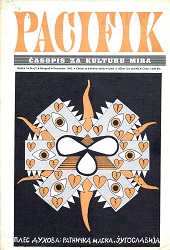
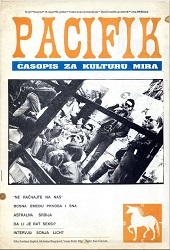
published in 1992 by "Centar za antiratnu akciju"
More...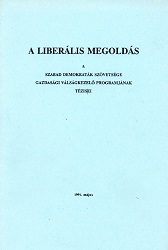
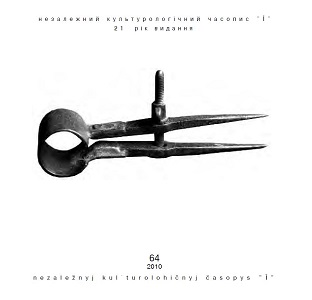
In order to make the thorough mendacity of Putin's rhetoric about "Ukraine as a State of Neo-Nazis" fully evident, CEEOL is offering the Ukrainian Jewish journal ”Ї“ as the strongest possible proof of a habit of "modern Ukrainian and world intellectual thought". The NGO "Ї", an independent cultural organization founded in the late 1980's in L'viv, focuses on modern Ukrainian and world intellectual thought. It offers periodic forums for discussion of issues concerning Ukraine and, among others, Europe, Russia, post-Byzantium, the Muslim Renaissance. It analyzes the current situation in order to develop future socio-political strategies. The organization also publishes "Ї", a quarterly journal dealing with European and Ukrainian issues in politics, philosophy, and culture. It also examines the relationship of Ukrainians with Russians, Poles, Austrians, and Jews and places Ukraine in a modern geopolitical sphere that can further Ukraine's identity as a modern state.
More...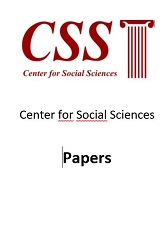
This paper provides historical background to the formation of Georgia’s current borders in the course of 20th century and analyzes the stance of Georgian state on border delimitation after independence. In the first part of the article, the period of 1918-1921 when most border changes took place in the South Caucasus is examined. Then the Soviet period is discussed. The article moves on to examine the period of 1991-93, during which the successor states of the USSR reconfirmed the internal republican borders of the USSR. The second part of the article describes the process of Georgia’s negotiations with neighbouring states on border delimitation after the restoration of independence. Delimitation of the border cannot be achieved unilaterally. It is a bilateral process and the failure to reach the consensus should be attributed to both negotiating parties. The aim of this article is not the identification of the guilty party, but rather identification of the actual reasons for lack of progress in negotiations. It reflects a Georgian perspective of the past and present state of play, since it is mostly based on documentary analysis and interviews conducted in Georgia. This research argues that the lack of political will from all negotiating parties has been the main reason for protraction of the process of border delimitation. It is a first attempt to bridge the existing gap in research on the border delimitation issue in interstate relations. Unfortunately, border delimitation is a field which has not been extensively researched either by Georgian or by international scholars, which makes this article even more timely and relevant.
More...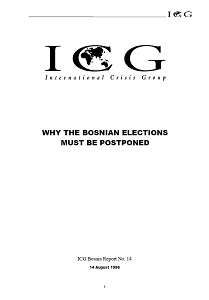
The violent events in Mostar on 10 February -- and the failure of the International Police Task Force (IPTF) and the Stabilisation Force (SFOR) to either anticipate or control them -- constitute a mortal threat to the peace in Bosnia and Herzegovina and to the continued existence of the Bosniac-Croat Federation.
More...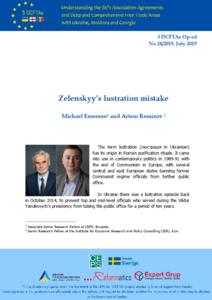
The term lustration (люстрація in Ukrainian) has its origin in Roman purification rituals. It came into use in contemporary politics in 1989-91 with the end of Communism in Europe, with several central and east European states banning former Communist regime officials from further public office. In Ukraine there was a lustration episode back in October 2014, to prevent top and mid-level officials who served during the Viktor Yanukovych’s presidency from taking the public office for a period of ten years.
More...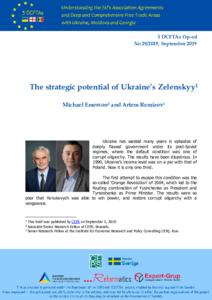
Ukraine has wasted many years in episodes of deeply flawed government under its post-Soviet regimes, where the default condition was one of corrupt oligarchy. The results have been disastrous. In 1990, Ukraine’s income level was on a par with that of Poland. Now it is only one third. The first attempt to escape this condition was the so-called ‘Orange Revolution’ of 2004, which led to the feuding combination of Yushchenko as President and Tymoshenko as Prime Minister. The results were so poor that Yanukovych was able to win power, and restore corrupt oligarchy with a vengeance.
More...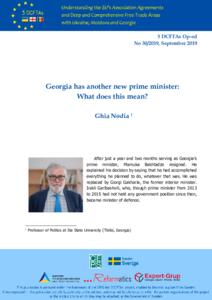
After just a year and two months serving as Georgia’s prime minister, Mamuka Bakhtadze resigned. He explained his decision by saying that he had accomplished everything he planned to do, whatever that was. He was replaced by Giorgi Gakharia, the former interior minister. Irakli Garibashvili, who, though prime minister from 2013 to 2015 had not held any government position since then, became minister of defence.
More...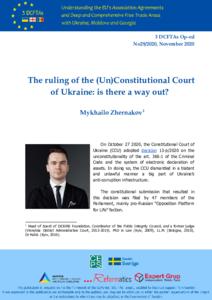
On October 27 2020, the Constitutional Court of Ukraine (CCU) adopted decision 13-p/2020 on the unconstitutionality of the art. 366-1 of the Criminal Code and the system of electronic declaration of assets. In doing so, the CCU dismantled in a blatant and unlawful manner a big part of Ukraine’s anti-corruption infrastructure. The constitutional submission that resulted in this decision was filed by 47 members of the Parliament, mainly pro-Russian “Opposition Platform for Life” faction.
More...